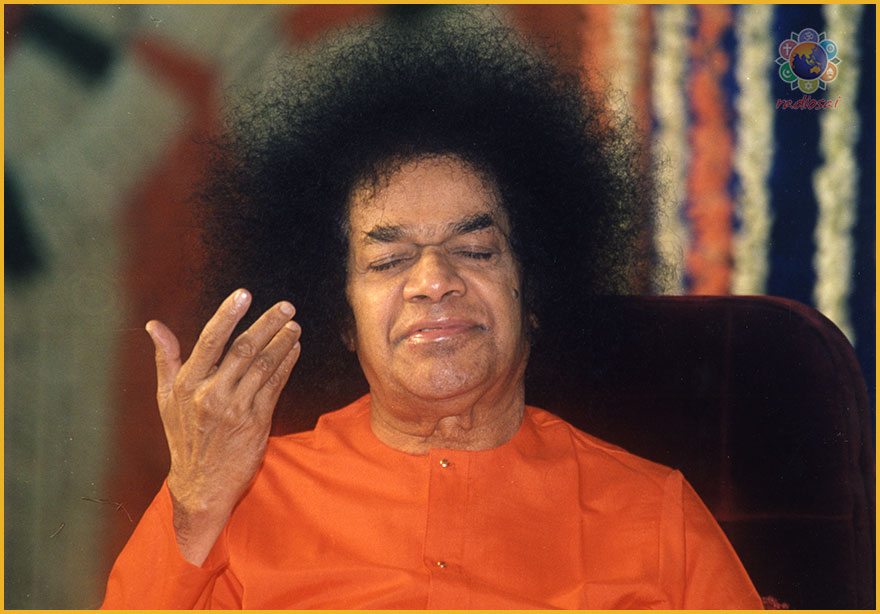|
|
| 'Like' us on Facebook | Follow us: |
Posted on: July 27, 2018
Heaven Is Only A Frame of Mind Away
Structured Guidelines for a Spiritual Aspirant from Sai, the Sadguru
By Dr Michael Goldstein
Part 02
Nine Points to Further Spiritual Progress
I will describe a simple approach to formulating a helpful plan to further our spiritual progress that is based on Swami's teachings. I don't want to give you the impression that you can package spirituality, but you can think about it and apply yourself to it in an orderly manner, just as you would apply yourself to your mundane occupations in your own life. This sample plan consists of nine simple points.
The sample is simple! Three points have to do with our outlook on life, another three have to do with our attitude in life and the last three have to do with our actions in life. Outlook, attitude and action - what do we think about things, how do we feel about things and what do we do about things.
I'll elucidate each one of these with experiences that I have had with Swami wherever possible. Remember, this plan is an example, it is a sample. All people must have their own plan depending on their state of understanding and development.
Let’s begin with the three points under the category of ‘our outlook on life’.
1. Forget the Past, Live in the Present
Don't worry about the past but learn from your mistakes. We should learn from the past but not be pre-occupied with it. These are Swami's words. We must appreciate life now, in this moment. We should not let past mistakes or sadness taint the present or the future.
 |
Forty-three years ago my wife and I came to India for Swami's padanamaskar for the first time. I found faith, hope and love. Among these, love was the greatest. My wife also felt the same. I felt a profound abiding love for Swami, a love that I had never felt before and this continued and has grown over the years. My love for Him is my reason for being.
I had Swami's darshan in Mumbai, then Swami permitted us to go in the aeroplane with Him to Brindavan and finally to Prasanthi Nilayam. I realised that I will always be His devotee and realised that I had found the purpose of my life, the love of my life. I knew I will follow Him to the end of the Earth.
On the day of our departure, Swami spoke with us and gave us guidance. We then took padanamaskar and I went to the bhajan hall. When I listened to the bhajans, I began to think of my very worldly past.
I thought about following Swami to the end of the path, which was to achieve self-realisation, to become a saint. Then I thought about my past when I was a musician, before I became a doctor. It wasn't very saintly. I easily concluded that I was unworthy. I became very sad. I thought I cannot follow the love of my life, our beloved Bhagawan to the end of the path because of my unworthiness.
As I listened to the bhajans, tears flowed from my eyes. My head was bowed, and I wept sadly. Suddenly I felt a hand on my shoulder. Swami had come out of the interview room and entered the bhajan hall from the back door. I looked over my shoulder and Swami was there! He leaned over, close to me and said, “Forget the past, forget the past.” Then He walked on.
I felt as though I had experienced the meaning of redemption, an epiphany. I was no longer chained to my past. Swami liberated me from my self-imposed bondage. I was free, free to follow Him always. I had purpose and direction in my life, and I proceeded with deep confidence. I had faith and abiding love for our beloved Swami.
So point number one: Don't worry about the past, learn from your mistakes.
2. Do Not Be Pre-occupied with the Future, Live in the Present and Make Appropriate Plans to Accomplish Your Goals
Many years ago there was a Sai devotee who had cancer. His doctors gave him chemotherapy, but his cancer returned again and again. He went to Swami regularly and appealed to Him for His divine intervention. The man lived many years beyond the term predicted by the doctors.
One day this man came to me and told me that he had just come to India and that he had refused the chemotherapy recommended by his physicians in America. He implored me to ask Swami to intervene to save him. Since I knew that Swami had spoken with the man on many occasions in the past I cautiously informed Swami that the man was in the Ashram.
Generally nobody could recommend for the other with Swami. He always said that His connection with everyone is heart to heart. Nevertheless, Swami was very receptive and encouraged me to tell Him about this man. So I proceeded to tell Him that this man's cancer has returned, and that his doctors have advised him a course of chemotherapy which he has refused and has come to Swami once again begging for his life.
After I gave Swami a complete account of his condition, Swami was quiet for a moment and then very gently said, “This man has had cancer for twelve years. Every time he has come to Swami, he has been thinking only of his cancer. Swami has given him twelve years of life and he has thought only of his death. He has not used the time that Swami has given to live.”
It was very sad to hear what Swami said, but nevertheless our beloved Swami did see the man, did prolong his life once again, and for many years thereafter. A very happy ending indeed. But a very important lesson too. We should not become so pre-occupied with the future that we fail to appreciate the present. Swami tells us to live in the present which is omnipresent.
3. Not To Be Unduly Concerned about Other Peoples Reaction to Us or Our Worldly Events
We should look upon all people as our divine brothers and sisters and all events as God given opportunities to serve. Swami teaches us that we are three people - the one we think we are, corresponding to our bodies; the one other people think we are, corresponding to our minds; and the one we really are, corresponding to our soul.
We are not these bodies, we are not these minds. We are the spirit of God encased in human form. Therefore our emotions and actions should not be reactions to other people or external events in the world. Our motivation, direction and destination should be governed by the Master through our conscience.
The next three points are under the category of ‘our attitude to life’.
4. Be Loving Always
Very simple. Be selflessly loving always. Our beloved Swami has come to light the lamp of love in the heart of humanity. The qualities of light are purity and selflessness. The powers of the light are redemption and transformation.
The Lord contains all of His creation and He is immanent in everything. Just as the Lord is greater than creation that has just emanated from Him, in the same manner selfless love transcends and is greater than our familiar human expressions and experiences of love. Most of us have some hardness in our hearts. Some people have huge boulders of granite and others a little pebble. We must open our hearts and soften our tendencies.
 |
As Sai devotees, how do we love Swami? How should we love Swami? On a superficial level we are delighted with Bhagawan Baba's beautiful form and enchanted by His divine personality. Is this not love? Yes, it is but it’s not sufficient.
On a deeper level we are inspired by the noble words and deeds of Bhagawan Baba and we aspire to emulate His heroic actions. Is this not love? Yes, it is love but it’s not sufficient.
Ultimately we recognise that Swami is the source and embodiment of the highest, noblest and truest aspect of ourselves. We turn our minds inward and we see the divine light of truth and love. We understand that our spiritual heart is our true identity and that it is one with the Lord.
We achieve selflessness, the duality between God and ourselves ceases to exist. We merge in the Lord, we become one with our beloved Swami, our divine Consciousness. All of us must strive to love Him in this fashion. This is really love, this is divine love!
To love spiritually is to love selflessly, that is, love without desire. Love, love without need to possess the object of love. Love without need for recognition of love, love without need for reciprocation of love. That is pure love, selfless love, divine love. We learn to love in our various human relationships - mother, father, sons, daughters, husbands and wives. We learn to love in these relationships so that we can eventually love God as He loves us selflessly.
Loving God has a dramatic effect on our lives. It transforms us and those who know us. If we find selfless love, all else will come. This is the most important of the nine points that I am presenting to you. Be loving always, love selflessly always.
5. Be Happy Always
Be happy and joyful inside, always. Happiness is contagious. When we show a smile or any gesture of joy, we shine light into the minds and hearts of our brothers and sisters. We make others happy. Then they make us happier, and it goes on. Happiness begets joy. The realisation of our own Divinity is perfect bliss.
Once I was supposed to go to Swami on a certain date when Swami came in a dream prior to my departure and said, “Postpone your trip by three days and go directly to Kodaikanal.” It was so vivid and overwhelming that fortunately I followed what my dream said. I went directly to Kodaikanal.
This was many years ago. I was very stout then. Saying stout is an evasion of truth really. Actually, I was quiet fat!
Swami looked down at me and was silent for a moment. Then He said something to the students in Telugu, they all looked up at me and began to laugh. Then Swami said something else and the intensity of the student’s laughter increased.
Swami then looked down at me again and Himself began to laugh heartily. When I looked at Swami I was moved by the joy and happiness on Swami's face. Then I also began to laugh. So Swami laughed, the students laughed and I also laughed - we were all laughing gleefully.
I knew that the joke was on me but I didn't care. Swami's laughter filled me with intense joy. Then suddenly Swami stopped laughing, and instantly all of the students became very quiet.
Swami looked at me very seriously and said, “Why are you laughing?”
I said, “Swami, I am laughing because Swami is laughing. I am happy because Swami is happy, I am laughing because I love Swami so much.”
Then Swami talked to the students who had become very serious not knowing what to expect. I too didn't know what to expect.
Swami then said to the students, “Goldstein is laughing because Swami is laughing. Goldstein is happy because Swami is happy. That is real devotion.”
These seemingly innocuous incidents that I have related to you is the way Swami often taught us important lessons. Swami used me to demonstrate devotion to the students. Being happy is very important. Swami is always saying to all of us, 'Be happy, be happy - chala santhosham'.
6. Be Quiet and Peaceful Always
Being quiet inside is being peaceful. Peace is absence of turbulent emotion and incessant thoughts. Being quiet inside is essential in order to hear the inner voice of God or the outer voice of God. Respect and preserve the inner temple of silence.
 |
Whenever Swami was speaking in your presence, you listen attentively even if His remarks were not directed to you. There was always a reason for you to hear whatever Swami was saying. I am going to show you what happens when you don't listen carefully.
One day Swami graciously permitted me to sit in the front seat of His car while we drove around Puttaparthi. An important Indian government official was seated with Swami in the back seat. The man was very intently speaking to Swami about important matters.
I felt the joy of Swami's nearness. I became happier and happier and my happiness evolved into a blissful state in which I became oblivious to Swami's conversation with the politician.
The rear-view mirror was to the side, so Swami could not see my face, He could see only the back of my head. I was just very still. I could hear nothing. I was immersed in the bliss of Swami's proximity, a blissful reverie.
Suddenly I heard Swami's voice from the back seat. Very sharply Swami said to me, “Goldstein, control your mind.”
Needless to say I came back to it very fast. It was amazing how Swami knew that I had gone off into a blissful reverie. I thought Swami can only see the back of my head but knew that I have gone, gone into a blissful reverie.
Also apparent to me was Swami's instruction that we should always focus and pay attention and listen carefully to Swami. Whenever you had the opportunity to be near Swami and He spoke in your presence, regardless to whom, it was important for us to pay attention and listen carefully.
If you are quiet inside, you are controlling your desires and ego. You open the door for the inner voice. In this example I made my mind too quiet, ceased to focus on Swami's voice. I closed the door to the outer voice, Swami's voice. I indulged myself and went into a serene, a supreme bliss.
Even though my joy was in response to Swami, I failed to perform my duty. My duty was to listen to Swami. With Swami one had to be prepared to hear the outer voice of God as well as the inner voice of God, always! This was the mistake; it was very subtle but important point.
The last three points belong to the category of “actions”.
7. Do Not Permit Unworthy or Inappropriate Thoughts to Linger in Your Mind
Swami teaches us that we should regard bad thoughts as demons that enter our minds to divert us from spiritual paths. Bad thoughts generate emotions and actions which in turn create bad tendencies, and eventually bad habits.
Our conscience should screen all thoughts and determine if a thought is worthy of entering our mind. We can permit entry to noble thoughts and feelings and refuse entry to unholy elements. This will result in good character and lead to spiritual progress. We have the key, we are in control, we are the gatekeepers of our minds.
Many years ago I developed a naive strategy to put an end to thoughts that distracted me and disturbed my equilibrium when Swami was nearby. I thought, I am sitting on the veranda, Swami is giving darshan and I am permitting distraction by my superfluous worldly thoughts. I must clear my mind in Swami's divine presence. If I cannot clear my mind in the presence of the Lord, then how can I aspire to achieve spiritual progress?
So I developed a rather foolish and childish technique. This was a long time ago.
Every time an inappropriate thought would enter my mind while I was sitting on the veranda and Swami was off giving darshan, I would pre-empt the thought by saying to myself, 'be gone frivolous thought, away with you'. And shake my head slightly. I would shake my head negatively very slightly so that people would not see what I was doing.
For a while this technique seemed to be effective, however soon I found that I was being bombarded by so many frivolous thoughts that I was sitting on the veranda shaking my head almost continuously. I realised I was a foolish man.
It occurred to me that my brothers on the veranda, many of whom are physicians, would conclude that I was developing a seizure disorder. So I abandoned my ingenious technique.
The saving grace is that I was aware of my wayward mind especially in divine presence. Then I applied myself to eliminate my transgression. It was a foolish attempt but nevertheless it was my dedicated approach to this.
8. Follow Your Conscience, Act Without Procrastination and With Complete Confidence
One day another devotee and I were seated at Swami's divine lotus feet. Swami began to talk to me and pointed to the other man sitting at the side. He told me that this other man was a very good devotee.
 |
Swami elaborated and mentioned that whenever this other man had to make a decision he would look within himself and seek the answer from his own conscience. The man never doubted that the answer would come.
Swami also said that the man would ask himself, ‘is it right or is it wrong, is it good or is it bad, what would Swami do?’ And then would act according to the answer that he heard from his own conscience without procrastination.
Swami added that sometimes the answer did not come right away but the man would persist in his enquiry until he got the answer.
Swami placed great emphasis on the importance of this process in spirituality. And He said that this man was a very good devotee because he had faith.
Clearly we must recognise that our conscience represents the reflection of the Divinity within ourselves. The moral imperatives that come from our conscience must be respected.
Finally the last point.
9. Focus on Swami
Focus on Swami, His name, His form, His love, His words, His deeds, His everything because He is everything. At the same time recognise the presence of divine consciousness. Constant spiritual focus is essential for us to realise our spiritual purpose.
We can focus on our beloved Swami and His name and forms. We can focus on the great spiritual principles upon which all religions are based. We can focus on the goodness and godliness that we see all around us. Here in this gathering, all are expressions of the universal loving consciousness, that is God.
An extraordinary example of constant spiritual focus that I can relate to was demonstrated by Dr John Hislop. A very disciplined man, he was the first chairman of the USA Central Council of Swami's Organisation. He envisioned Swami at his side in all his waking moments. Whenever he went and whatever he did regardless of whether he was alone or with people or giving a talk or sitting in bhajan or prayer, he literally envisioned Swami at his side.
In fact envisioned is not the correct word. He said that he knew and perceived Swami at his side always. Hislop was a remarkable man, a brilliant man, a man with faith and determination.
In order to move in the right direction, it is imperative and important for us to consider our own outlook, attitude and actions. I have given a simple formula consisting of nine simple points. The sample is simple.
In summary, our outlook should include living in the present and not being pre-occupied with the past, the future or the reactions of people or events in the world. Our attitude should be loving, happy and quiet inside. Our actions should include discarding unworthy thoughts, following our conscience and focusing on the Lord.
I heartily advise you to make your own spiritual plan so that you will achieve the realisation of your spiritual purpose. Making a plan reflects your faith and determination.
The plan that I have given reflects Swami's basic teachings and generally applies to everyone. Actually, it’s more of a simple approach to life than a plan. Your own spiritual plans should include your spiritual practises, prayer, meditation, bhajan, study circle, service, your home, your family and your profession. It should be about how to fulfil all aspects of your life with love. Your own plan will fit you more precisely. It will be more suitable for who you are and where you are in your spiritual progress.
We all have different propensities, vasanas, different karma and different strengths and weaknesses. A good plan for spiritual development is an individual endeavour, a private project, the structure of which will come to you as you reflect and seek the answers within yourself.
It is important to make a spiritual plan best suited to your life. Bhagawan Sri Sathya Sai Baba, our beloved Swami, has taught us that the purpose of human life is to love and serve God’s creation.
Why Spirituality
In order to serve faithfully and selflessly we must be able to love deeply and truly. In order to really love, to love selflessly, we must rise above the sense of ‘me’ and ‘mine’. We accomplish this through spirituality.
 |
Spirituality is seeking the inner light by transcending the distractions and enticements of the outer world. Spirituality is the application of discipline based on faith and love which enables us to place the mind and the body at the service of the conscience. This is surrender to God.
When we accomplish this, we metamorphose from man - the animal, to man - the noble image of God. Spirituality does not require that we abandon our worldly relationships and responsibilities. To the contrary, in this Kali Yuga, our beloved Bhagawan Sri Sathya Sai Baba, taught us that spirituality requires that we fulfil our worldly roles and duties in a noble and exemplary manner through Sathya, Dharma, Shanti, Prema, and Ahimsa.
My dear brothers and sisters, in conclusion I want to remind you again. We must not forsake our great expectations. Let us pray to our beloved Swami that we will all rise above the duplicity of our minds and come to know the purity of our hearts. Let us pray to our dearest Swami that He will enable all of us to consciously and constantly experience His divine loving omnipresence.
Jai Sai Ram.
Thank you and loving Sai Ram,
Team Radio Sai
| comments powered by Disqus |
What are your impressions about this Tutor? Please share your feedback by writing to h2h@radiosai.org or listener@radiosai.org . Do not forget to mention your name and country please.






